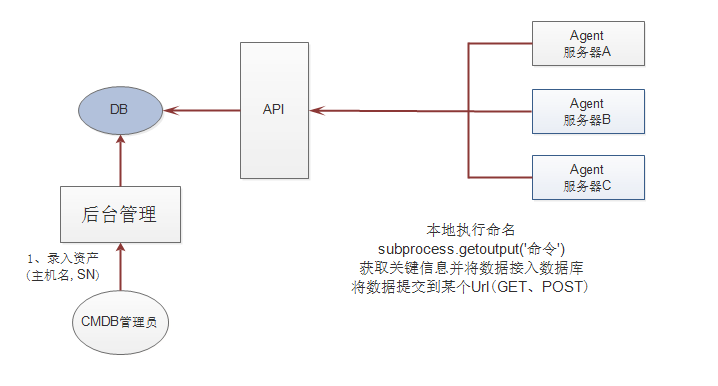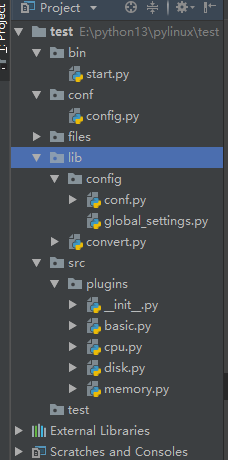CMDB_Agent版本
Jeff的技术栈 人气:0目录
- CMDB_Agent版本
- CMDB概念
- CMDB_Agent介绍
- agent方案
- ssh类方案
- 相比较
- 架构目录
- bin-start.py 启动文件
- conf-config.py 自定义配置文件
- files 开发测试的文件
- lib-config-global_settings.py 全局配置的文件
- lib-config-conf.py 读取配置的文件
- src-plugins-init.py 核心文件
- src-plugins-basic.py 查看硬件信息
- src-plugins-cpu.py 查看cpu属性
- src-plugins-disk.py 查看磁盘信息
CMDB_Agent版本
CMDB概念
CMDB: Configure Manage DataBase
中文:配置管理数据库。
主要的作用是:收集服务器的基础信息(包括:服务器的主机名,ip,操作系统版本,磁盘,CPU等信息),将来提供给子系统(代码发布,工单系统等)数据CMDB_Agent介绍

其本质上就是在各个服务器上执行subprocess.getoutput()命令,然后将每台机器上执行的结果,返回给主机API,然后主机API收到这些数据之后,放入到数据库中,最终通过web界面展现给用户
优点:速度快
缺点:需要为每台服务器步数一个Agent的程序agent方案
将待采集的服务器看成一个agent,然后再服务器上使用python的subprocess模块执行linux相关的命令,然后分析得到的结果,将分析得到的结果通过requests模块发送给API,API获取到数据之后,进行二次比对数据,最后将比对的结果存入到数据库中,最后django起一个webserver从数据库中将数据获取出来,供用户查看ssh类方案
在中控机服务器上安装一个模块叫paramiko模块,通过这个模块登录到带采集的服务器上,然后执行相关的linux命令,最后返回执行的结果,将分析得到的结果通过requests模块发送给API,API获取到数据之后,进行二次比对数据,最后将比对的结果存入到数据库中,最后django起一个webserver从数据库中将数据获取出来,供用户查看相比较
agent方案
优点:不需要额外的增加中控机。
缺点:每新增一台服务器,就需要额外部署agent脚本。使用场景是:服务器多的情况 (1000台以上)
ssh方案
优点:不需要额外的部署脚本。
缺点:速度比较慢。使用场景是:服务器少 (1000台往下)架构目录

bin-start.py 启动文件
from src.plugins import PluginsManager
if __name__ == '__main__':
res = PluginsManager().execute()
for k, v in res.items():
print(k, v)
conf-config.py 自定义配置文件
模仿Django的setting,常用的配置写在这里面。不常用的写在global_settings.py中。
加载顺寻:先加载全局的。再加载局部的
USER = 'root'
MODE = 'agent'
DEBUG = True # True:代表是开发测试阶段 False:代表是上现阶段
import os
BASEDIR = os.path.dirname(os.path.dirname(os.path.abspath(__file__)))
# 模仿Django中间件,插拔式
PLUGINS_DICT = {
'basic': 'src.plugins.basic.Basic',
'cpu': 'src.plugins.cpu.Cpu',
#'disk': 'src.plugins.disk.Disk',
'memory': 'src.plugins.memory.Memory',
}
files 开发测试的文件
DEBUT=True时为测试阶段,用files的测试数据
lib-config-global_settings.py 全局配置的文件
passlib-config-conf.py 读取配置的文件
全局配置放在前面先加载,自定义配置的放在后面后加载。自定义配置了就用自定义的(覆盖),没有配置久用全局的
from conf import config
from . import global_settings
class mySettings():
def __init__(self):
# print('aa:', dir(global_settings))
# print('bb:', dir(config))
# 全局配置
for k in dir(global_settings):
if k.isupper():
v = getattr(global_settings, k)
setattr(self, k, v)
# 自定义配置
for k in dir(config):
if k.isupper():
v = getattr(config, k)
setattr(self, k, v)
settings = mySettings()
src-plugins-init.py 核心文件
from lib.config.conf import settings
import importlib
class PluginsManager():
def __init__(self):
self.plugins_dict = settings.PLUGINS_DICT
self.debug = settings.DEBUG
# 1.采集数据
def execute(self):
response = {}
for k, v in self.plugins_dict.items():
'''
k: basic
v: src.plugins.basic.Basic
'''
# 2.循环导入(字符串路径)
moudle_path, class_name = v.rsplit('.', 1) # ['src.plugins.basic','Basic']
# 用importlib.import_module()导入字符串路径
m = importlib.import_module(moudle_path)
# 3.导入类
cls = getattr(m, class_name)
# 循环执行鸭子类型的process方法,command_func函数的内存地址传过去,把debug传过去
ret = cls().process(self.command_func, self.debug)
response[k] = ret
return response
# 真正的连接,执行命令,返回结果的函数。命令变成参数
def command_func(self, cmd):
if settings.MODE == 'agent':
import subprocess
res = subprocess.getoutput(cmd)
return res
else:
import paramiko
# 创建SSH对象
ssh = paramiko.SSHClient()
# 允许连接不再know_hosts文件中的主机
ssh.set_missing_host_key_policy(paramiko.AutoAddPolicy())
# 连接服务器
ssh.connect(hostname='10.0.0.200', port=22, username='root', password='123456')
# 执行命令
stdin, stdout, stderr = ssh.exec_command(cmd)
# 获取命令结果
result = stdout.read()
# 关闭连接
ssh.close()
return result
src-plugins-basic.py 查看硬件信息
from conf import config
class Basic(object):
def process(self, command_func, debug):
if debug:
output = {
'os_platform': "linux",
'os_version': "CentOS release 6.6 (Final)\nKernel \r on an \m",
'hostname': 'c1.com'
}
else:
output = {
'os_platform': command_func("uname").strip(),
'os_version': command_func("cat /etc/issue").strip().split('\n')[0],
'hostname': command_func("hostname").strip(),
}
return outputsrc-plugins-cpu.py 查看cpu属性
import os
from lib.config.conf import settings
class Cpu():
def __init__(self):
pass
def process(self, command_func, debug):
if debug:
output = open(os.path.join(settings.BASEDIR, 'files/cpuinfo.out'), 'r', encoding='utf-8').read()
else:
output = command_func("cat /proc/cpuinfo")
return self.parse(output)
def parse(self, content):
"""
解析shell命令返回结果
:param content: shell 命令结果
:return:解析后的结果
"""
response = {'cpu_count': 0, 'cpu_physical_count': 0, 'cpu_model': ''}
cpu_physical_set = set()
content = content.strip()
for item in content.split('\n\n'):
for row_line in item.split('\n'):
key, value = row_line.split(':')
key = key.strip()
if key == 'processor':
response['cpu_count'] += 1
elif key == 'physical id':
cpu_physical_set.add(value)
elif key == 'model name':
if not response['cpu_model']:
response['cpu_model'] = value
response['cpu_physical_count'] = len(cpu_physical_set)
return responsesrc-plugins-disk.py 查看磁盘信息
# 采集磁盘信息
from lib.config.conf import settings
import os
import re
class Disk(object):
def __init__(self):
pass
def process(self, command_func, debug):
if debug:
output = open(os.path.join(settings.BASEDIR, 'fileshttps://img.qb5200.com/download-x/disk.out'), 'r', encoding='utf-8').read()
else:
output = command_func('MegaCli -PDList -aALL') # radi 卡 磁盘阵列
return self.parse(output) # 调用过滤的函数
# 过滤函数,对字符串的处理过滤
def parse(self, content):
"""
解析shell命令返回结果
:param content: shell 命令结果
:return:解析后的结果
"""
response = {}
result = []
for row_line in content.split("\n\n\n\n"):
result.append(row_line)
for item in result:
temp_dict = {}
for row in item.split('\n'):
if not row.strip():
continue
if len(row.split(':')) != 2:
continue
key, value = row.split(':')
name = self.mega_patter_match(key)
if name:
if key == 'Raw Size':
raw_size = re.search('(\d+\.\d+)', value.strip())
if raw_size:
temp_dict[name] = raw_size.group()
else:
raw_size = '0'
else:
temp_dict[name] = value.strip()
if temp_dict:
response[temp_dict['slot']] = temp_dict
return response
@staticmethod
def mega_patter_match(needle):
grep_pattern = {'Slot': 'slot', 'Raw Size': 'capacity', 'Inquiry': 'model', 'PD Type': 'pd_type'}
for key, value in grep_pattern.items():
if needle.startswith(key):
return value
return False加载全部内容